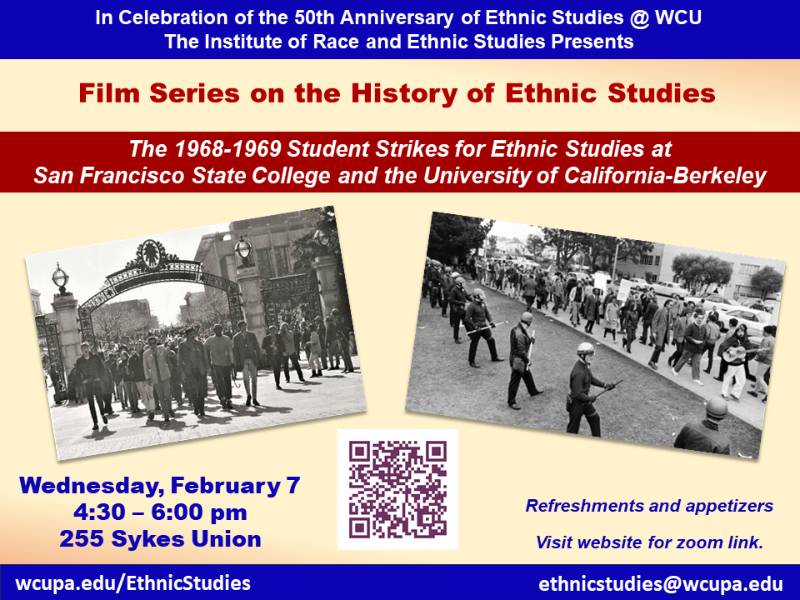Photo: News_Ethic_Studies_1: “Film Series on the History of Ethnic Studies” flier via the Ethnic Studies department on wcupa.edu
On Feb. 7, West Chester University’s director of Ethnic Studies, Dr. Miguel Ceballos, hosted a film screening in celebration of the 50th anniversary of Ethnic Studies at the university. The films shown were short documentaries about the history of the Ethnic Studies program in the United States, specifically the amount of large and often violent protests that occurred on college campuses in 1968-69.
The common understanding for immigrants in the U.S. at the time was that they should attempt to assimilate into white America as quickly as possible and ignore the significance of their ethnic backgrounds and identities.
The Third World Liberation Front (TWLF), a coalition of diverse organizations at San Francisco State University, was dissatisfied with the lack of diverse education among their diverse student population. In response to their institution’s inaction, the TWLF drafted a list of fifteen demands directed towards the college’s administration. The three core principles to these demands were third-world students’ right to an education, the formation of an ethnic studies program, and the hiring of new third-world staff to offer their experiences. Although conversations about the issue were started, the student coalition began striking on Nov. 6, 1968.
Dr. Ceballos put into perspective that earlier that same year, Rev. Martin Luther King Jr. was assassinated, and that there was simultaneous momentum among the teachings of Malcolm X, the Black Panther Party and the Black Power Movement — all stirring up students’ desires for direct action.
Dan Gonzales, a current professor at SFSU who teaches courses in Asian American history and sociology, stated in an interview within one of the event’s documentaries that, “I had not found a group of people that I could talk to about political issues. In global terms, yes, but not in ethnic-specific terms, like how does this affect Filipino Americans?”
After five months of student and faculty protests, TWLF and a select committee of faculty reached a tentative agreement on March 14, 1969. The agreement’s terms included more admission spots for underrepresented students, re-hiring of select faculty that had been fired during the strikes and establishing a “College of Ethnic Studies.”
Professor Laureen Chew EdD, another professor at SFSU who was featured, stated in the “Celebrate Heritage, Celebrate Unity” documentary that she thinks most people would assume that we have assimilated and would wash away one’s race and that people wouldn’t be interested in these ethnic studies classes. However, she finds that students are still interested in the classes, asking themselves “How do I fit in this American context?” The Institute of Race and Ethnic Studies at WCU will be hosting two more events on March 6 and April 4 for the “Film Series on the History of Ethnic Studies,” via wcupa.edu.
Gaven Mitchell is a third-year History Major and Journalism Minor. GM1001024@wcupa.edu

